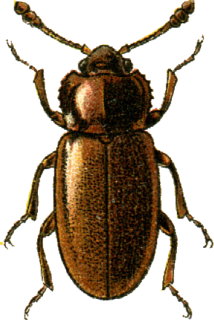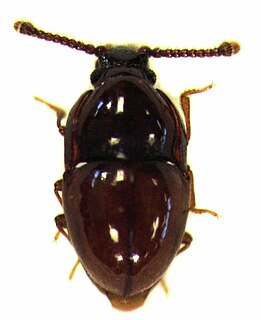
Pharaxonotha is a genus of pleasing fungus beetles in the family Erotylidae. There are at least three described species in Pharaxonotha.
Aphorista is a genus of handsome fungus beetles in the family Endomychidae. There are at least three described species in Aphorista.

Atomariinae is a subfamily of silken fungus beetles in the family Cryptophagidae. There are about 8 genera and more than 170 described species in Atomariinae.

Atomariini is a tribe of silken fungus beetles in the family Cryptophagidae. There are about 5 genera and at least 70 described species in Atomariini.

Henoticus is a genus of silken fungus beetles in the family Cryptophagidae. There are at least four described species in Henoticus.
Henotiderus is a genus of silken fungus beetles in the family Cryptophagidae. There are at least four described species in Henotiderus.
Atomaria wollastoni is a species of silken fungus beetle in the family Cryptophagidae. It is found in Europe & Northern Asia and North America.

Atomaria is a genus of silken fungus beetles in the family Cryptophagidae. There are at least 160 described species in Atomaria.
Atomaria stricticollis is a species of silken fungus beetle in the family Cryptophagidae. It is found in North America.
Atomaria ephippiata is a species of silken fungus beetle in the family Cryptophagidae. It is found in North America.
Atomaria nigrirostris is a species of silken fungus beetle in the family Cryptophagidae. It is found in Africa, Europe & Northern Asia, and North America.
Atomaria vespertina is a species of silken fungus beetle in the family Cryptophagidae. It is found in North America.
Atomaria fuscata is a species of silken fungus beetle in the family Cryptophagidae. It is found in Europe & Northern Asia, North America, and Southern Asia.
Phymaphora is a genus of handsome fungus beetles in the family Endomychidae. There are at least two described species in Phymaphora.
Tisactia is a genus of silken fungus beetles in the family Cryptophagidae. There is at least one described species in Tisactia, T. subglabra.
Atomaria testacea is a species of silken fungus beetle in the family Cryptophagidae. It is found in Africa, Europe & Northern Asia, and North America.
Atomaria apicalis is a species of silken fungus beetle in the family Cryptophagidae. It is found in Europe & Northern Asia and North America.
Renodesta is a genus of silken fungus beetles in the family Cryptophagidae. There are at least two described species in Renodesta.
Hadromychus is a genus of handsome fungus beetles in the family Endomychidae. There is at least one described species in Hadromychus, H. chandleri.





